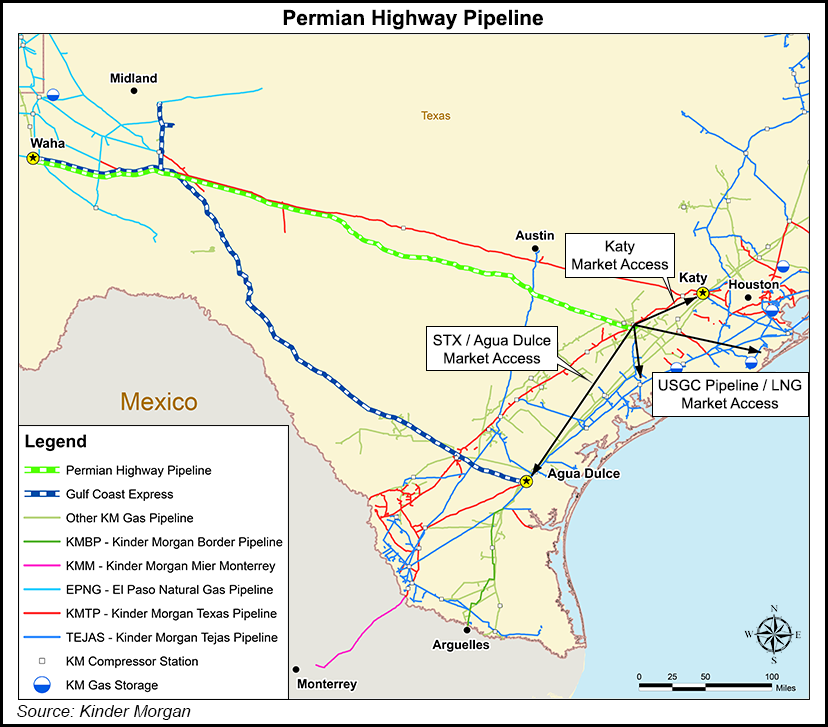Regulatory | Infrastructure | NGI All News Access | NGI The Weekly Gas Market Report
Texas Hill Country Backlash Continues for 2 Bcf/d Permian Highway Project
One of Kinder Morgan Inc.’s proposed natural gas conduits from the Permian Basin to the Texas coast is facing more legal attacks from cities and landowners in the iconic Hill Country, which now claim the Permian Highway Pipeline (PHP) is in violation of federal environmental mandates.

The cities of Austin and San Marcos, Travis and Hays counties, along with the Barton Springs Edwards Aquifer Conservation District and affected landowners, filed a lawsuit this month against the U.S. Department of Interior, its U.S. Fish and Wildlife Service (USFWS) and Kinder affiliates regarding the development of the 42-inch diameter, 430-mile pipeline.
PHP is tentatively set to begin service in 2021.
The lawsuit was filed in U.S. District Court for the Western District of Texas, Austin Division (No. 1:20-cv-00138). PHP is to be routed through “sensitive environmental features, including the Edwards and Trinity Aquifer recharge zones as well as habitat for many federally listed species that are protected” under the Endangered Species Act (ESA).
Kinder “has failed to apply for or obtain an incidental take permit under Section 10 of the ESA, which is required for private construction, operation, maintenance and related activities that will harm the various imperiled species on nonfederal property along the PHP route.”
An incidental take permit, issued by the USFWS, covers construction, operation, maintenance and other activities that could harm species along the pipeline’s route. The plaintiffs also called out the USFWS for failing to comply with the Administrative Procedure Act and the National Environmental Policy Act.
The lawsuit is similar to other legal challenges PHP has or is facing to bar construction through the Hill Country. One challenge was settled last October with the Hill Country city of Kyle, as Kinder agreed to provide additional safeguards during pipeline construction.
During the fourth quarter conference call last month, Kinder CEO Steve Kean said PHP had acquired 99%-plus of the rights of way for the project.
The lawsuit claims that while the Kinder management team “has made many public statements about its progress on the PHP construction and its intent to begin construction in the Hill Country imminently,” it “has provided very little information to affected landowners and local governments regarding the final route, timing, construction methods, permitting and plans to avoid, minimize and mitigate adverse impacts to vulnerable aquatic and terrestrial species that will be adversely affected” by the operator’s actions.
Kinder spokesperson Katherine Hill told NGI on Monday the operator continues to make “good progress on the Permian Highway Pipeline project and construction is well underway near the Waha area in West Texas.
“Throughout its development, we have actively worked with all of our stakeholders to ensure we have the best possible route. These outreach efforts have resulted in nearly 200 route changes to accommodate landowners and address what we have learned in land surveys. As a result of these diligent efforts, we have reached agreements on 100% of the right-of-way for this project.”
Kinder is in “full compliance” with ESA requirements for the PHP, Hill said.
“Throughout the development of PHP we have actively worked with the appropriate state and federal agencies, including those agencies tasked with protecting endangered species. PHP’s environmental assessments, among other things, comprehensively considered those endangered species that could potentially be affected by the project, and our construction plans have been designed to minimize impacts to those species.
“We remain committed to preserving the environment including endangered species, and we have gone above and beyond established requirements to do so.”
© 2024 Natural Gas Intelligence. All rights reserved.
ISSN © 1532-1231 | ISSN © 2577-9877 | ISSN © 1532-1266 |
